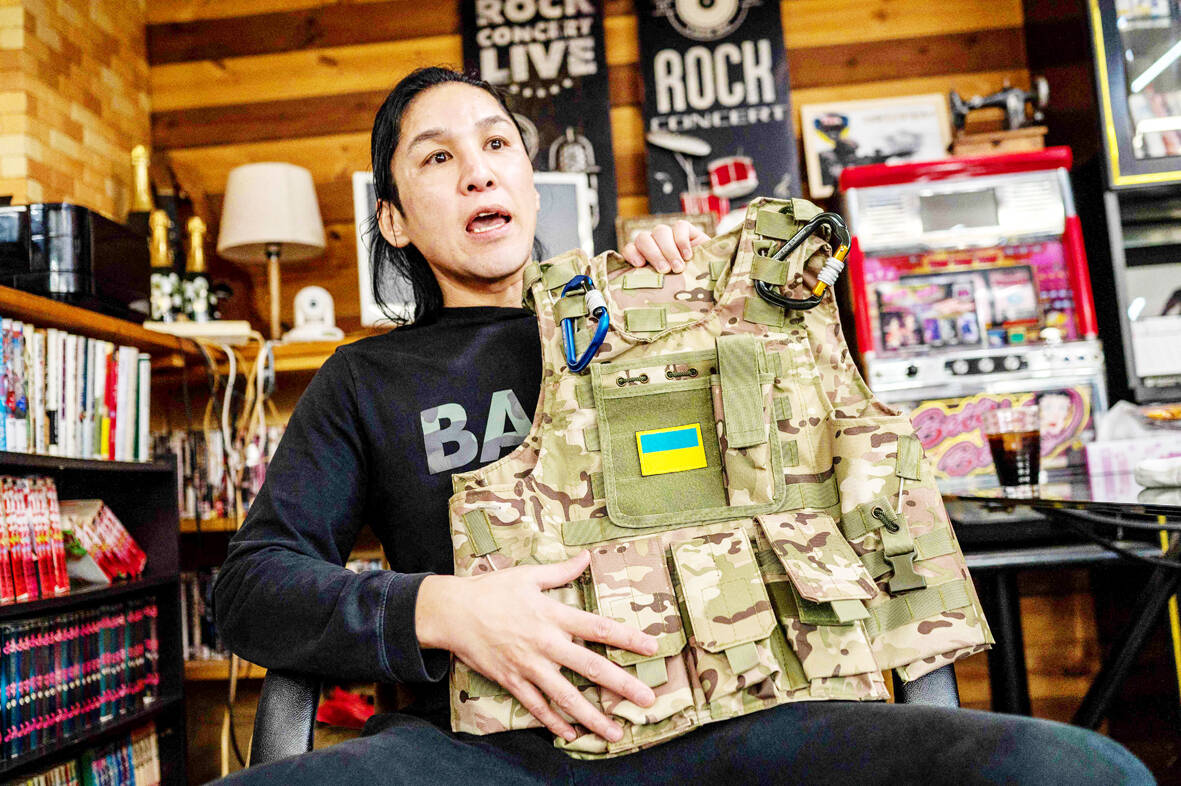Yuya Motomura, a mahjong parlour manager in Japan, had always wanted a way to prove himself to a society he felt looked down on him. Then Russia invaded Ukraine.
The 45-year-old is one of a handful of Japanese men who have joined Ukrainians battling the Russian invasion, defying their government’s warnings and bucking a decades-long national principle of pacifism.
Japan’s military is constitutionally limited to defence and has not fought since World War II.

Photo: AFP
Still, Motomura said he was immediately captivated by the idea of fighting in Ukraine when he saw President Volodymyr Zelensky talking about “defending our independence, our country”.
“I’ve always felt that I’m someone who is more socially conscious than other people realise,” he said as he prepared to leave Japan for the conflict.
“By fighting for Ukraine, I could prove it with more than just words.”
Motomura took a first trip to Ukraine just two months after Russia’s invasion, initially carrying supplies for refugees and the displaced.
He was determined to find a place among the country’s fighters, and after several trips was accepted into the Georgian Legion, which includes many foreign members.
He is not the legion’s first recruit from Japan, and his acceptance was eased by a compatriot, who goes by Haru-san and has acknowledged previously belonging to the yakuza — the Japanese mafia.
Georgian Legion commander Mamuka Mamulashvili told AFP the unit currently counts eight Japanese among troops from 33 nationalities in its ranks.
“They are very motivated, very disciplined and easily master the training they are undergoing now,” he said.
AGAINST GOVERNMENT ADVICE
While many of the foreign fighters who have flocked to Ukraine from other countries come with military and combat experience, Japan’s unique constitutional constraints mean its volunteers start as absolute novices.
And when Ukraine’s embassy in Tokyo initially called for volunteers to join the fight — echoing an invitation by Zelensky for foreign support — it quickly retracted it.
Japan’s government, like those elsewhere, has warned its citizens against travel to Ukraine.
A small determined group has ignored that advice.
Last year, Japan confirmed a citizen who was reportedly a former member of the country’s military had been killed in combat in Ukraine.
And Motomura said he had been contacted by members of Japan’s Self-Defense Forces who were supportive of his plans.
“I think many people in this country feel frustrated about being bound under the constitution,” he said.
Motomura has already helped recruit others to the cause, with Kenjiro Miyamori, a former cook, saying he was inspired by him to join the legion.
“I am sure there are many men in Ukraine who don’t want to go to the war front but have to for the loved ones,” the 44-year-old said, speaking by video from Ukraine.
“I want to replace one of them and fight for their country.”
‘WORTHLESS IN JAPAN’
Motomura admits his motivations are tied up in his personal circumstances, including a difficult childhood.
“I stopped going to school in fourth grade (age 10),” he said, recounting his earliest memory — sitting backstage at an evening cabaret where his mother performed.
She developed a mental illness after escaping his abusive father, and he left school to take care of her, he said.
He now runs a shop where customers play the Chinese tile game mahjong, sleeping during the day and living apart from his two children and their mother.
“If I had money and this shop was going well, I wouldn’t go,” he said as he packed items including camouflage jackets and khaki vests.
“I am a worthless person in Japan, but I am hoping to bring back something from Ukraine.”
Miyamori too cites his divorce and the separation from his three-year-old son as part of his motivation to fight.
“I think there are many people like me,” he said.
The two men arrived in Ukraine in April, but are circumspect about the exact nature of their training, saying only it includes plenty of running and exercises.
Motomura said he did not yet know when, or even if, he would be deployed, but he had no regrets about his decision.
“People in Ukraine may feel encouraged just by the fact that we came here all the way from Japan,” he said from Kyiv.
“I am here in this country, hoping to make use of myself. In that sense, I already feel fulfilled.”